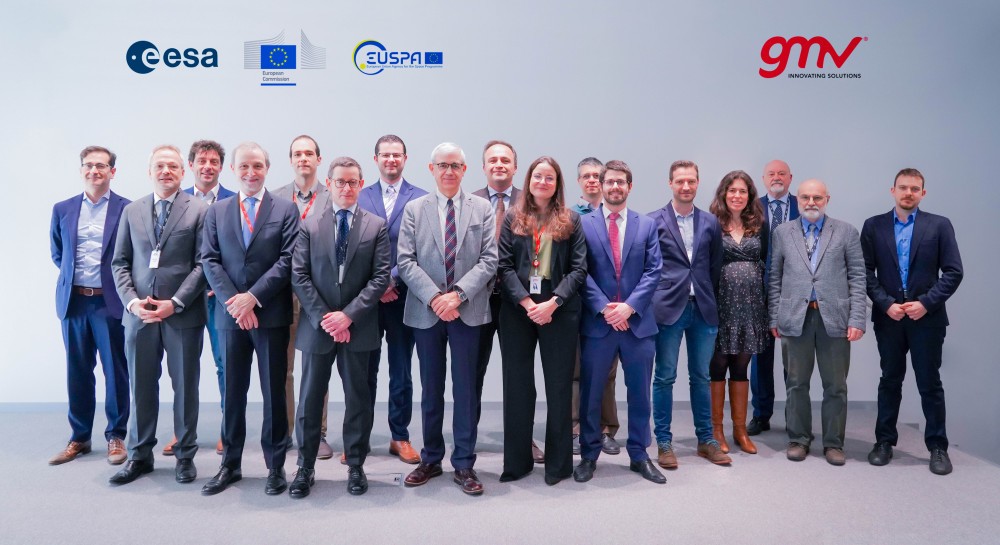GMV celebrates the start of the G2STB project

On 10 March GMV's Grisolía headquarters in Madrid hosted the signing ceremony of the G2STB project awarded to GMV by the European Space Agency (ESA) to develop the Test Bed of the second-generation Galileo system.
The G2STB project is one of the key infrastructure elements that ESA is developing for the successful operation of the second-generation Galileo satellites (G2G). This new generation of satellites represents a major step forward for the Galileo constellation, incorporating numerous technological upgrades. G2STB is part of this upgrade to ensure a smooth transition from the first generation (G1G) of Galileo to the second generation and that key technology elements required in the second generation ground segment are adequately covered.
As part of this project, GMV will lead a consortium of over 20 partners, including Thales Alenia Space Italia (TAS-I) as a core partner and a total of 20 entities from 8 different European countries, further strengthening GMV's role as a top-level participant in the Galileo program.
In addition to a sizable representation of GMV professionals, the event was also attended by representatives of various entities of the project, including representatives from the European Space Agency (ESA).
After the welcoming address by Miguel Romay, GMV's General Manager of Satellite Navigation, the floor was taken by Jesús B. Serrano, GMV's CEO, who in his speech spoke of GMV's track record from its foundation (1984) up to its present position as a prime contractor of ground segments and its relevance in the space market. Serrano also highlighted the company's beginnings in the area of satellite navigation in 1988, its enormous development and evolution to become a key player in the EGNOS and Galileo satellite navigation systems, becoming today an undisputed leader in GNSS safety critical systems and advanced solutions for GNSS-based high-precision positioning. He concluded by stressing the importance of the G2STB project award, which also makes GMV a key player in the second generation of Galileo at the system level. Before concluding his speech he thanked all the attendees for their attendance, congratulated GMV's G2STB team, led by the satellite navigation sector and with the collaboration of other sectors and made special mention of ESA and the members of the industrial consortium.
Then Miguel Romay, GMV's general manager of satellite navigation, took the floor again. In his talk he gave an overview of the company's activities in navigation programs, particularly Galileo, highlighting the main challenges and most important milestones. He also stressed the honor of having taken part in the EGNOS and Galileo programs practically from their inception in 1996 and thanked the GMV team and ESA for the success of both programs. Finally, he stressed the importance of testbeds and G2STB's crucial role in the context of Galileo Generation II (G2G).
Miguel Romay gave the floor to Miguel Manteiga, ESA's second-generation Galileo development project manager, who began his remarks by congratulating GMV on the award of the G2STB project. In his talk, Manteiga underlined that the European Space Agency has currently launched 50 contracts to improve Galileo's capabilities and guarantee its service. He then specifically highlighted this project as one of the key contracts within the G2G field segment and explained its objective, infrastructure, the team involved, and its development and progress.
Lastly, Irma Rodríguez, GMV's Director of Navigation Products and Services and Adrián García, Head of the Navigation Infrastructure and Test Bed Division, also spoke at the event. Irma Rodríguez presented the consortium involved in the project with special mention of GMV's sectoral Secure e-Solutions and GMV's team in Poland. In her speech, she did not want to forget other business units and internal divisions such as INGS, NTI or QA/RAMS, in addition to the different corporate departments, whose contribution she considered essential for the contract award. Adrián García, for his part, focused his speech on the G2STB project, its objectives and its role within the context of the second generation of Galileo, highlighting the technical and programmatic challenges of the project and stressing that it is precisely these challenges that underline GMV's potential and values.
The event concluded with the signing of the contract by Enio Guarino, head of ESA's Galileo program department, and Miguel Romay, GMV's general manager of satellite navigation.